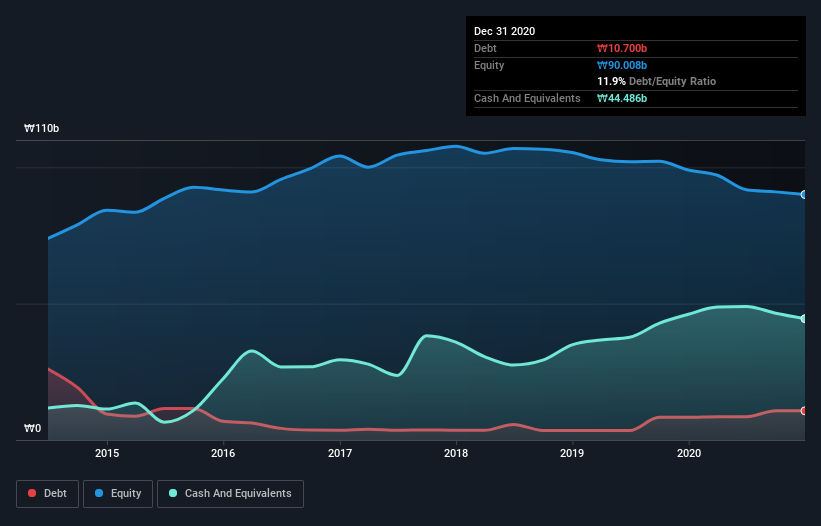
The external fund manager backed by Berkshire Hathaway's Charlie Munger, Li Lu, makes no bones about it when he says 'The biggest investment risk is not the volatility of prices, but whether you will suffer a permanent loss of capital.' So it seems the smart money knows that debt - which is usually involved in bankruptcies - is a very important factor, when you assess how risky a company is. We can see that SH Energy & Chemical Co., Ltd. (KRX:002360) does use debt in its business. But the real question is whether this debt is making the company risky.
Why Does Debt Bring Risk?
Generally speaking, debt only becomes a real problem when a company can't easily pay it off, either by raising capital or with its own cash flow. In the worst case scenario, a company can go bankrupt if it cannot pay its creditors. However, a more frequent (but still costly) occurrence is where a company must issue shares at bargain-basement prices, permanently diluting shareholders, just to shore up its balance sheet. Of course, the upside of debt is that it often represents cheap capital, especially when it replaces dilution in a company with the ability to reinvest at high rates of return. When we examine debt levels, we first consider both cash and debt levels, together.
View our latest analysis for SH Energy & Chemical
What Is SH Energy & Chemical's Net Debt?
As you can see below, at the end of December 2020, SH Energy & Chemical had ₩10.7b of debt, up from ₩8.30b a year ago. Click the image for more detail. However, it does have ₩44.5b in cash offsetting this, leading to net cash of ₩33.8b.

A Look At SH Energy & Chemical's Liabilities
We can see from the most recent balance sheet that SH Energy & Chemical had liabilities of ₩7.40b falling due within a year, and liabilities of ₩20.0b due beyond that. Offsetting these obligations, it had cash of ₩44.5b as well as receivables valued at ₩16.2b due within 12 months. So it actually has ₩33.4b more liquid assets than total liabilities.
This excess liquidity suggests that SH Energy & Chemical is taking a careful approach to debt. Given it has easily adequate short term liquidity, we don't think it will have any issues with its lenders. Simply put, the fact that SH Energy & Chemical has more cash than debt is arguably a good indication that it can manage its debt safely. There's no doubt that we learn most about debt from the balance sheet. But you can't view debt in total isolation; since SH Energy & Chemical will need earnings to service that debt. So if you're keen to discover more about its earnings, it might be worth checking out this graph of its long term earnings trend.
Over 12 months, SH Energy & Chemical made a loss at the EBIT level, and saw its revenue drop to ₩94b, which is a fall of 34%. To be frank that doesn't bode well.
So How Risky Is SH Energy & Chemical?
Statistically speaking companies that lose money are riskier than those that make money. And the fact is that over the last twelve months SH Energy & Chemical lost money at the earnings before interest and tax (EBIT) line. And over the same period it saw negative free cash outflow of ₩1.7b and booked a ₩6.8b accounting loss. With only ₩33.8b on the balance sheet, it would appear that its going to need to raise capital again soon. Even though its balance sheet seems sufficiently liquid, debt always makes us a little nervous if a company doesn't produce free cash flow regularly. There's no doubt that we learn most about debt from the balance sheet. However, not all investment risk resides within the balance sheet - far from it. These risks can be hard to spot. Every company has them, and we've spotted 1 warning sign for SH Energy & Chemical you should know about.
Of course, if you're the type of investor who prefers buying stocks without the burden of debt, then don't hesitate to discover our exclusive list of net cash growth stocks, today.
If you're looking for stocks to buy, use the lowest-cost* platform that is rated #1 Overall by Barron’s, Interactive Brokers. Trade stocks, options, futures, forex, bonds and funds on 135 markets, all from a single integrated account. Promoted
New: Manage All Your Stock Portfolios in One Place
We've created the ultimate portfolio companion for stock investors, and it's free.
• Connect an unlimited number of Portfolios and see your total in one currency
• Be alerted to new Warning Signs or Risks via email or mobile
• Track the Fair Value of your stocks
This article by Simply Wall St is general in nature. It does not constitute a recommendation to buy or sell any stock, and does not take account of your objectives, or your financial situation. We aim to bring you long-term focused analysis driven by fundamental data. Note that our analysis may not factor in the latest price-sensitive company announcements or qualitative material. Simply Wall St has no position in any stocks mentioned.
*Interactive Brokers Rated Lowest Cost Broker by StockBrokers.com Annual Online Review 2020
Have feedback on this article? Concerned about the content? Get in touch with us directly. Alternatively, email editorial-team (at) simplywallst.com.
About KOSE:A002360
SH Energy & Chemical
Produces and sells expandable polystyrene (EPS) resin products in Korea.
Mediocre balance sheet very low.
Market Insights
Community Narratives




